EDU2110: Analysis of Transcultural Health Scenario in Australia
VerifiedAdded on 2023/04/21
|6
|1259
|455
Case Study
AI Summary
This case study evaluates the transcultural health scenario in Australia, focusing on the growing need for cultural competence among Australian clinicians. It highlights the increasing cultural and linguistic diversity in Australia and the importance of culturally sensitive healthcare for migrants and refugees, particularly women. The analysis emphasizes the necessity of a culturally insightful health workforce capable of understanding and addressing the diverse health outlooks and behavioral patterns of the population. The study also acknowledges the efforts of clinical education and knowledge development agencies in promoting unbiased healthcare. It concludes by pointing out the need for improved communication strategies, including the use of interpreters, to enhance doctor-patient relationships and improve health outcomes for migrants in Australia.
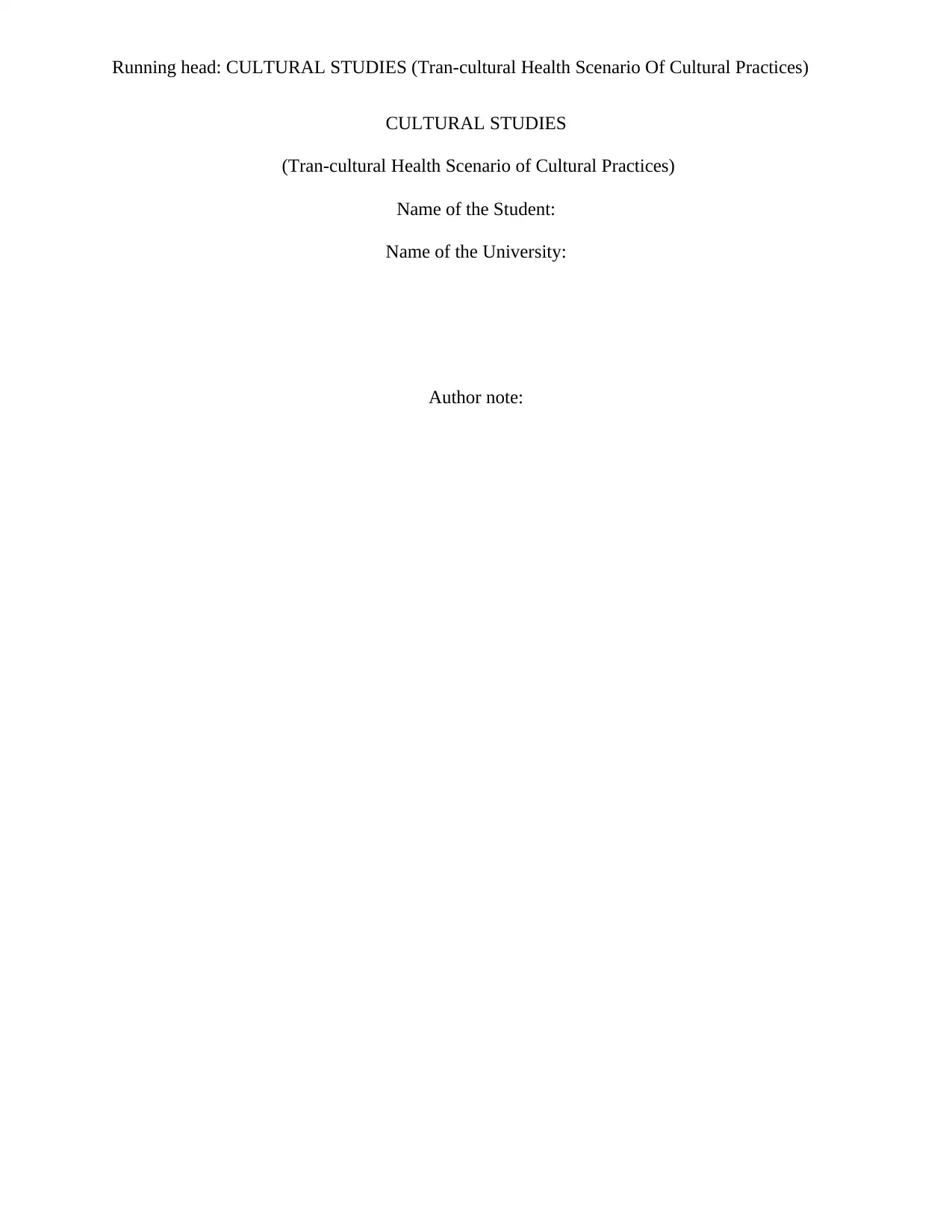
Running head: CULTURAL STUDIES (Tran-cultural Health Scenario Of Cultural Practices)
CULTURAL STUDIES
(Tran-cultural Health Scenario of Cultural Practices)
Name of the Student:
Name of the University:
Author note:
CULTURAL STUDIES
(Tran-cultural Health Scenario of Cultural Practices)
Name of the Student:
Name of the University:
Author note:
Paraphrase This Document
Need a fresh take? Get an instant paraphrase of this document with our AI Paraphraser
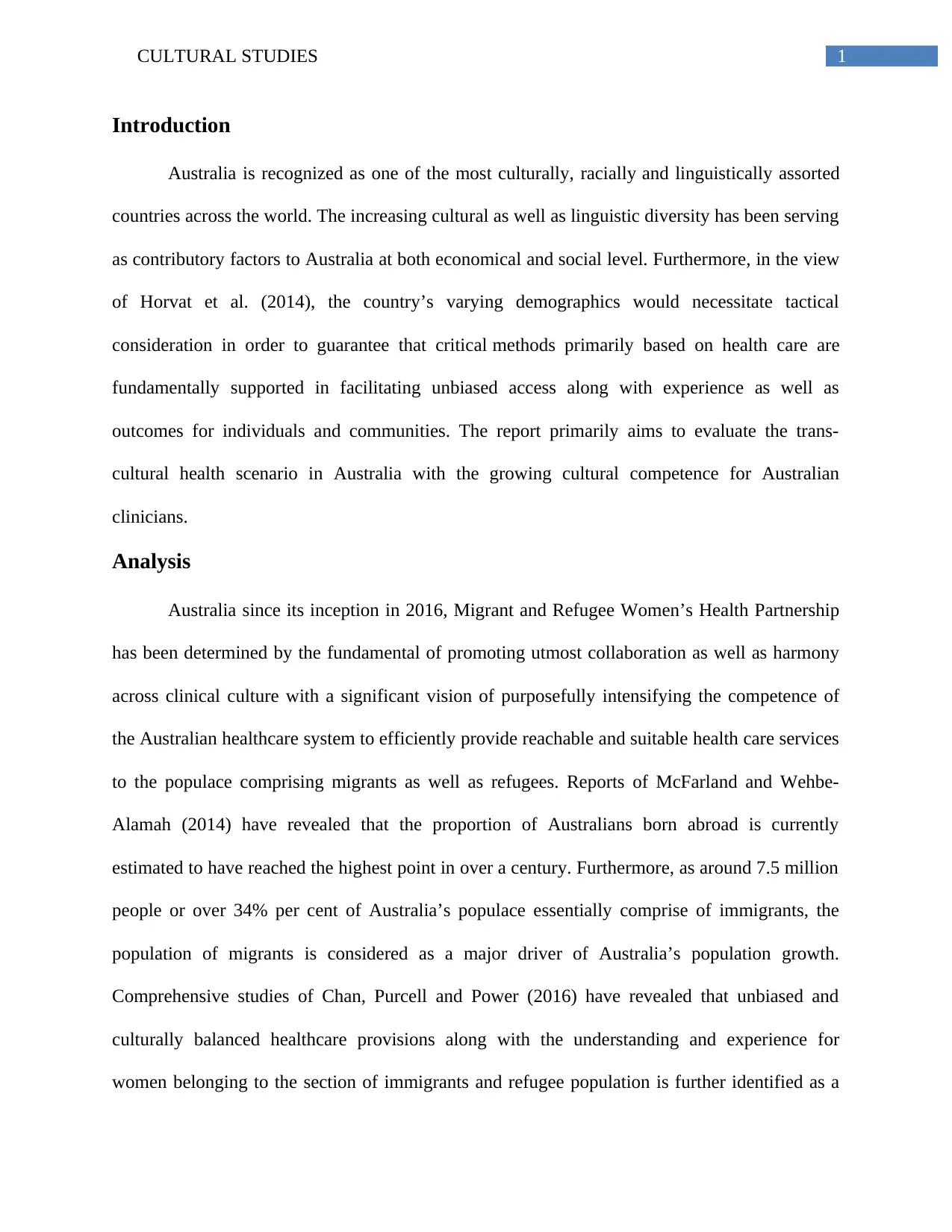
1CULTURAL STUDIES
Introduction
Australia is recognized as one of the most culturally, racially and linguistically assorted
countries across the world. The increasing cultural as well as linguistic diversity has been serving
as contributory factors to Australia at both economical and social level. Furthermore, in the view
of Horvat et al. (2014), the country’s varying demographics would necessitate tactical
consideration in order to guarantee that critical methods primarily based on health care are
fundamentally supported in facilitating unbiased access along with experience as well as
outcomes for individuals and communities. The report primarily aims to evaluate the trans-
cultural health scenario in Australia with the growing cultural competence for Australian
clinicians.
Analysis
Australia since its inception in 2016, Migrant and Refugee Women’s Health Partnership
has been determined by the fundamental of promoting utmost collaboration as well as harmony
across clinical culture with a significant vision of purposefully intensifying the competence of
the Australian healthcare system to efficiently provide reachable and suitable health care services
to the populace comprising migrants as well as refugees. Reports of McFarland and Wehbe-
Alamah (2014) have revealed that the proportion of Australians born abroad is currently
estimated to have reached the highest point in over a century. Furthermore, as around 7.5 million
people or over 34% per cent of Australia’s populace essentially comprise of immigrants, the
population of migrants is considered as a major driver of Australia’s population growth.
Comprehensive studies of Chan, Purcell and Power (2016) have revealed that unbiased and
culturally balanced healthcare provisions along with the understanding and experience for
women belonging to the section of immigrants and refugee population is further identified as a
Introduction
Australia is recognized as one of the most culturally, racially and linguistically assorted
countries across the world. The increasing cultural as well as linguistic diversity has been serving
as contributory factors to Australia at both economical and social level. Furthermore, in the view
of Horvat et al. (2014), the country’s varying demographics would necessitate tactical
consideration in order to guarantee that critical methods primarily based on health care are
fundamentally supported in facilitating unbiased access along with experience as well as
outcomes for individuals and communities. The report primarily aims to evaluate the trans-
cultural health scenario in Australia with the growing cultural competence for Australian
clinicians.
Analysis
Australia since its inception in 2016, Migrant and Refugee Women’s Health Partnership
has been determined by the fundamental of promoting utmost collaboration as well as harmony
across clinical culture with a significant vision of purposefully intensifying the competence of
the Australian healthcare system to efficiently provide reachable and suitable health care services
to the populace comprising migrants as well as refugees. Reports of McFarland and Wehbe-
Alamah (2014) have revealed that the proportion of Australians born abroad is currently
estimated to have reached the highest point in over a century. Furthermore, as around 7.5 million
people or over 34% per cent of Australia’s populace essentially comprise of immigrants, the
population of migrants is considered as a major driver of Australia’s population growth.
Comprehensive studies of Chan, Purcell and Power (2016) have revealed that unbiased and
culturally balanced healthcare provisions along with the understanding and experience for
women belonging to the section of immigrants and refugee population is further identified as a
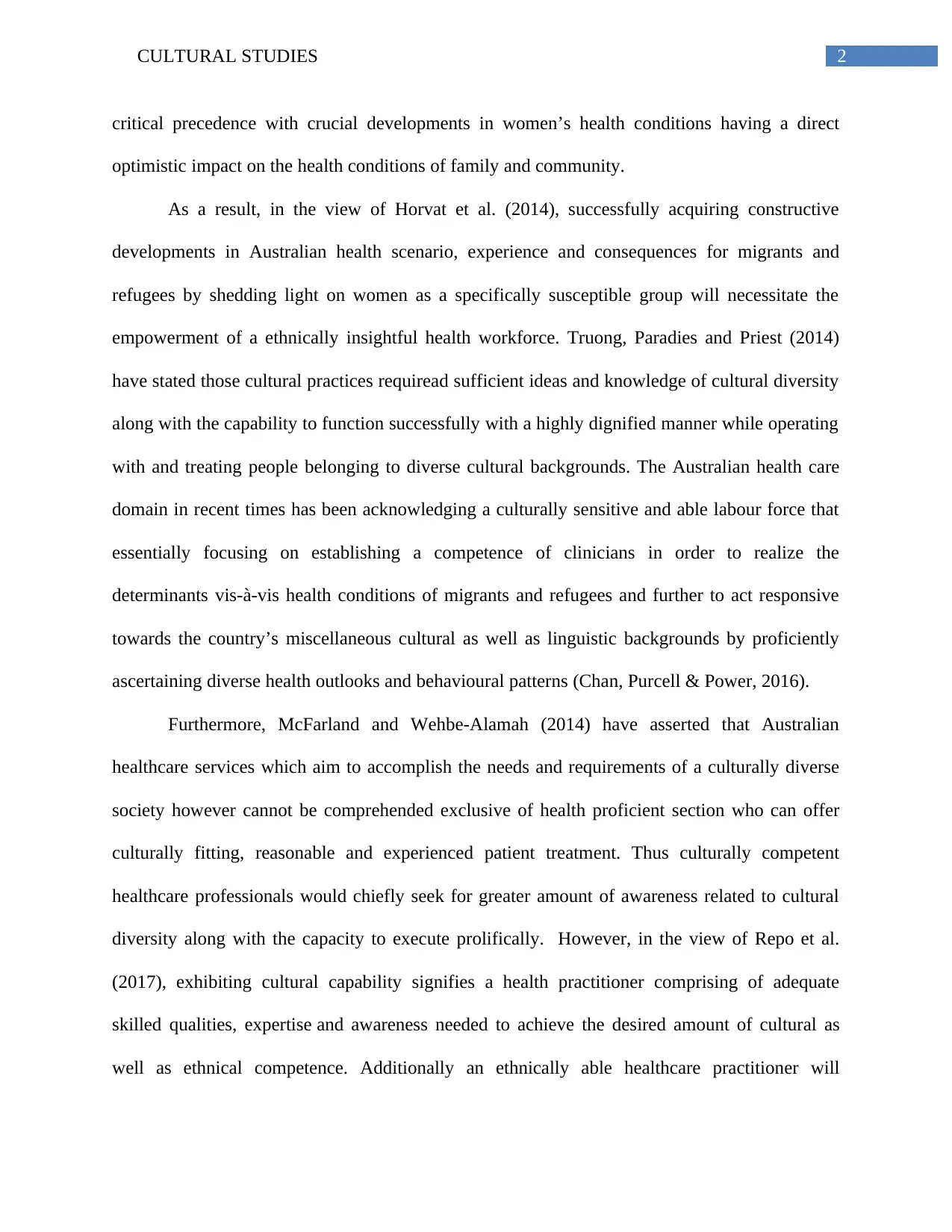
2CULTURAL STUDIES
critical precedence with crucial developments in women’s health conditions having a direct
optimistic impact on the health conditions of family and community.
As a result, in the view of Horvat et al. (2014), successfully acquiring constructive
developments in Australian health scenario, experience and consequences for migrants and
refugees by shedding light on women as a specifically susceptible group will necessitate the
empowerment of a ethnically insightful health workforce. Truong, Paradies and Priest (2014)
have stated those cultural practices requiread sufficient ideas and knowledge of cultural diversity
along with the capability to function successfully with a highly dignified manner while operating
with and treating people belonging to diverse cultural backgrounds. The Australian health care
domain in recent times has been acknowledging a culturally sensitive and able labour force that
essentially focusing on establishing a competence of clinicians in order to realize the
determinants vis-à-vis health conditions of migrants and refugees and further to act responsive
towards the country’s miscellaneous cultural as well as linguistic backgrounds by proficiently
ascertaining diverse health outlooks and behavioural patterns (Chan, Purcell & Power, 2016).
Furthermore, McFarland and Wehbe-Alamah (2014) have asserted that Australian
healthcare services which aim to accomplish the needs and requirements of a culturally diverse
society however cannot be comprehended exclusive of health proficient section who can offer
culturally fitting, reasonable and experienced patient treatment. Thus culturally competent
healthcare professionals would chiefly seek for greater amount of awareness related to cultural
diversity along with the capacity to execute prolifically. However, in the view of Repo et al.
(2017), exhibiting cultural capability signifies a health practitioner comprising of adequate
skilled qualities, expertise and awareness needed to achieve the desired amount of cultural as
well as ethnical competence. Additionally an ethnically able healthcare practitioner will
critical precedence with crucial developments in women’s health conditions having a direct
optimistic impact on the health conditions of family and community.
As a result, in the view of Horvat et al. (2014), successfully acquiring constructive
developments in Australian health scenario, experience and consequences for migrants and
refugees by shedding light on women as a specifically susceptible group will necessitate the
empowerment of a ethnically insightful health workforce. Truong, Paradies and Priest (2014)
have stated those cultural practices requiread sufficient ideas and knowledge of cultural diversity
along with the capability to function successfully with a highly dignified manner while operating
with and treating people belonging to diverse cultural backgrounds. The Australian health care
domain in recent times has been acknowledging a culturally sensitive and able labour force that
essentially focusing on establishing a competence of clinicians in order to realize the
determinants vis-à-vis health conditions of migrants and refugees and further to act responsive
towards the country’s miscellaneous cultural as well as linguistic backgrounds by proficiently
ascertaining diverse health outlooks and behavioural patterns (Chan, Purcell & Power, 2016).
Furthermore, McFarland and Wehbe-Alamah (2014) have asserted that Australian
healthcare services which aim to accomplish the needs and requirements of a culturally diverse
society however cannot be comprehended exclusive of health proficient section who can offer
culturally fitting, reasonable and experienced patient treatment. Thus culturally competent
healthcare professionals would chiefly seek for greater amount of awareness related to cultural
diversity along with the capacity to execute prolifically. However, in the view of Repo et al.
(2017), exhibiting cultural capability signifies a health practitioner comprising of adequate
skilled qualities, expertise and awareness needed to achieve the desired amount of cultural as
well as ethnical competence. Additionally an ethnically able healthcare practitioner will
⊘ This is a preview!⊘
Do you want full access?
Subscribe today to unlock all pages.

Trusted by 1+ million students worldwide
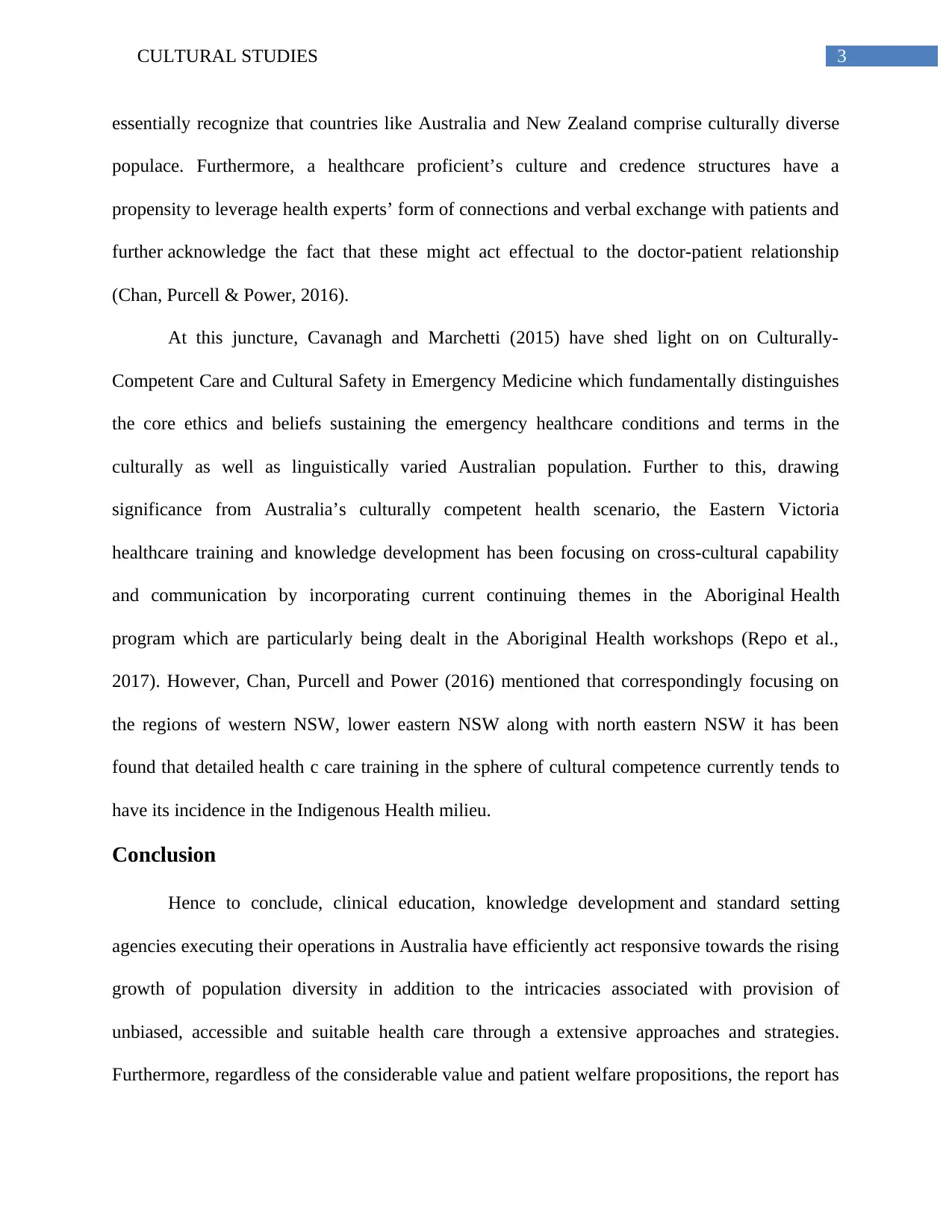
3CULTURAL STUDIES
essentially recognize that countries like Australia and New Zealand comprise culturally diverse
populace. Furthermore, a healthcare proficient’s culture and credence structures have a
propensity to leverage health experts’ form of connections and verbal exchange with patients and
further acknowledge the fact that these might act effectual to the doctor-patient relationship
(Chan, Purcell & Power, 2016).
At this juncture, Cavanagh and Marchetti (2015) have shed light on on Culturally-
Competent Care and Cultural Safety in Emergency Medicine which fundamentally distinguishes
the core ethics and beliefs sustaining the emergency healthcare conditions and terms in the
culturally as well as linguistically varied Australian population. Further to this, drawing
significance from Australia’s culturally competent health scenario, the Eastern Victoria
healthcare training and knowledge development has been focusing on cross-cultural capability
and communication by incorporating current continuing themes in the Aboriginal Health
program which are particularly being dealt in the Aboriginal Health workshops (Repo et al.,
2017). However, Chan, Purcell and Power (2016) mentioned that correspondingly focusing on
the regions of western NSW, lower eastern NSW along with north eastern NSW it has been
found that detailed health c care training in the sphere of cultural competence currently tends to
have its incidence in the Indigenous Health milieu.
Conclusion
Hence to conclude, clinical education, knowledge development and standard setting
agencies executing their operations in Australia have efficiently act responsive towards the rising
growth of population diversity in addition to the intricacies associated with provision of
unbiased, accessible and suitable health care through a extensive approaches and strategies.
Furthermore, regardless of the considerable value and patient welfare propositions, the report has
essentially recognize that countries like Australia and New Zealand comprise culturally diverse
populace. Furthermore, a healthcare proficient’s culture and credence structures have a
propensity to leverage health experts’ form of connections and verbal exchange with patients and
further acknowledge the fact that these might act effectual to the doctor-patient relationship
(Chan, Purcell & Power, 2016).
At this juncture, Cavanagh and Marchetti (2015) have shed light on on Culturally-
Competent Care and Cultural Safety in Emergency Medicine which fundamentally distinguishes
the core ethics and beliefs sustaining the emergency healthcare conditions and terms in the
culturally as well as linguistically varied Australian population. Further to this, drawing
significance from Australia’s culturally competent health scenario, the Eastern Victoria
healthcare training and knowledge development has been focusing on cross-cultural capability
and communication by incorporating current continuing themes in the Aboriginal Health
program which are particularly being dealt in the Aboriginal Health workshops (Repo et al.,
2017). However, Chan, Purcell and Power (2016) mentioned that correspondingly focusing on
the regions of western NSW, lower eastern NSW along with north eastern NSW it has been
found that detailed health c care training in the sphere of cultural competence currently tends to
have its incidence in the Indigenous Health milieu.
Conclusion
Hence to conclude, clinical education, knowledge development and standard setting
agencies executing their operations in Australia have efficiently act responsive towards the rising
growth of population diversity in addition to the intricacies associated with provision of
unbiased, accessible and suitable health care through a extensive approaches and strategies.
Furthermore, regardless of the considerable value and patient welfare propositions, the report has
Paraphrase This Document
Need a fresh take? Get an instant paraphrase of this document with our AI Paraphraser
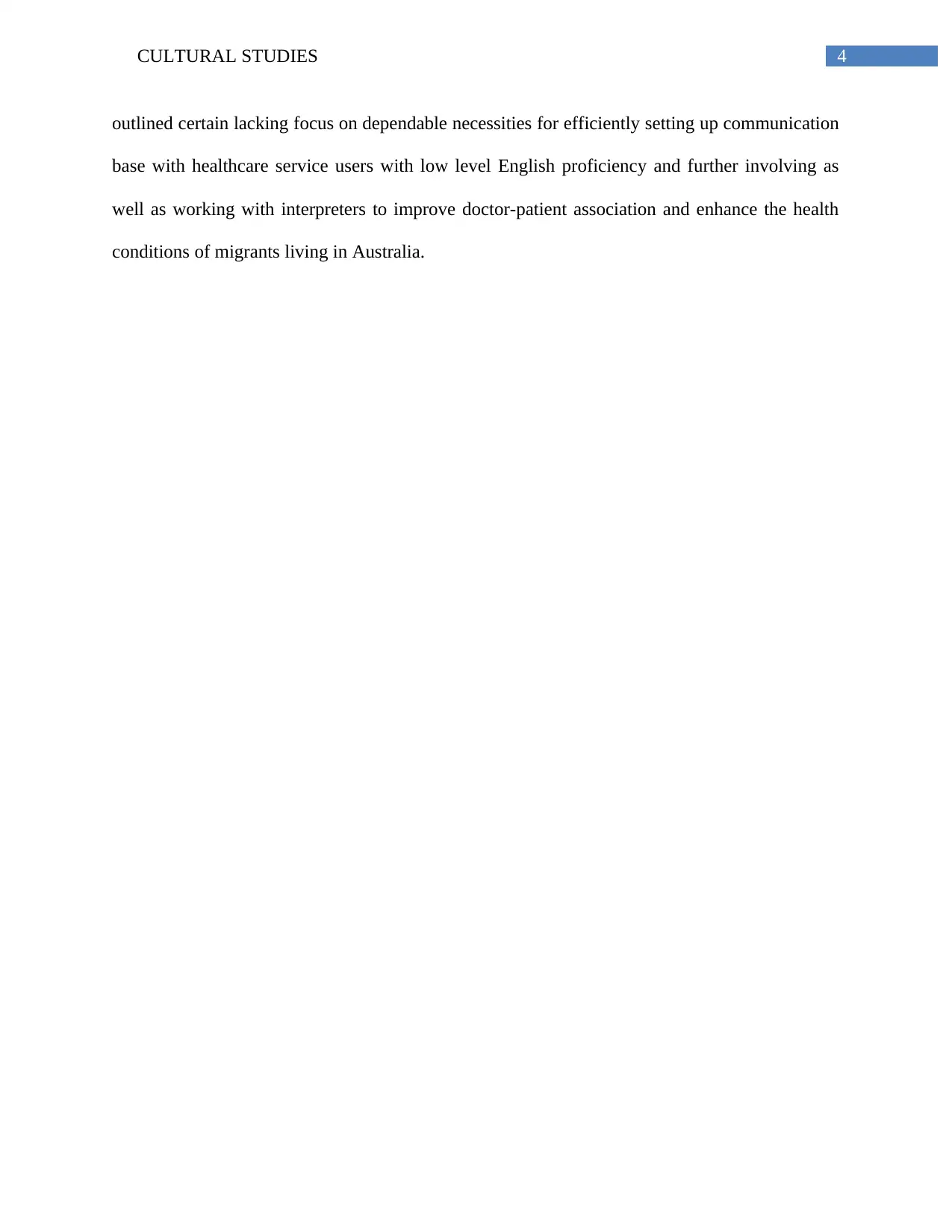
4CULTURAL STUDIES
outlined certain lacking focus on dependable necessities for efficiently setting up communication
base with healthcare service users with low level English proficiency and further involving as
well as working with interpreters to improve doctor-patient association and enhance the health
conditions of migrants living in Australia.
outlined certain lacking focus on dependable necessities for efficiently setting up communication
base with healthcare service users with low level English proficiency and further involving as
well as working with interpreters to improve doctor-patient association and enhance the health
conditions of migrants living in Australia.
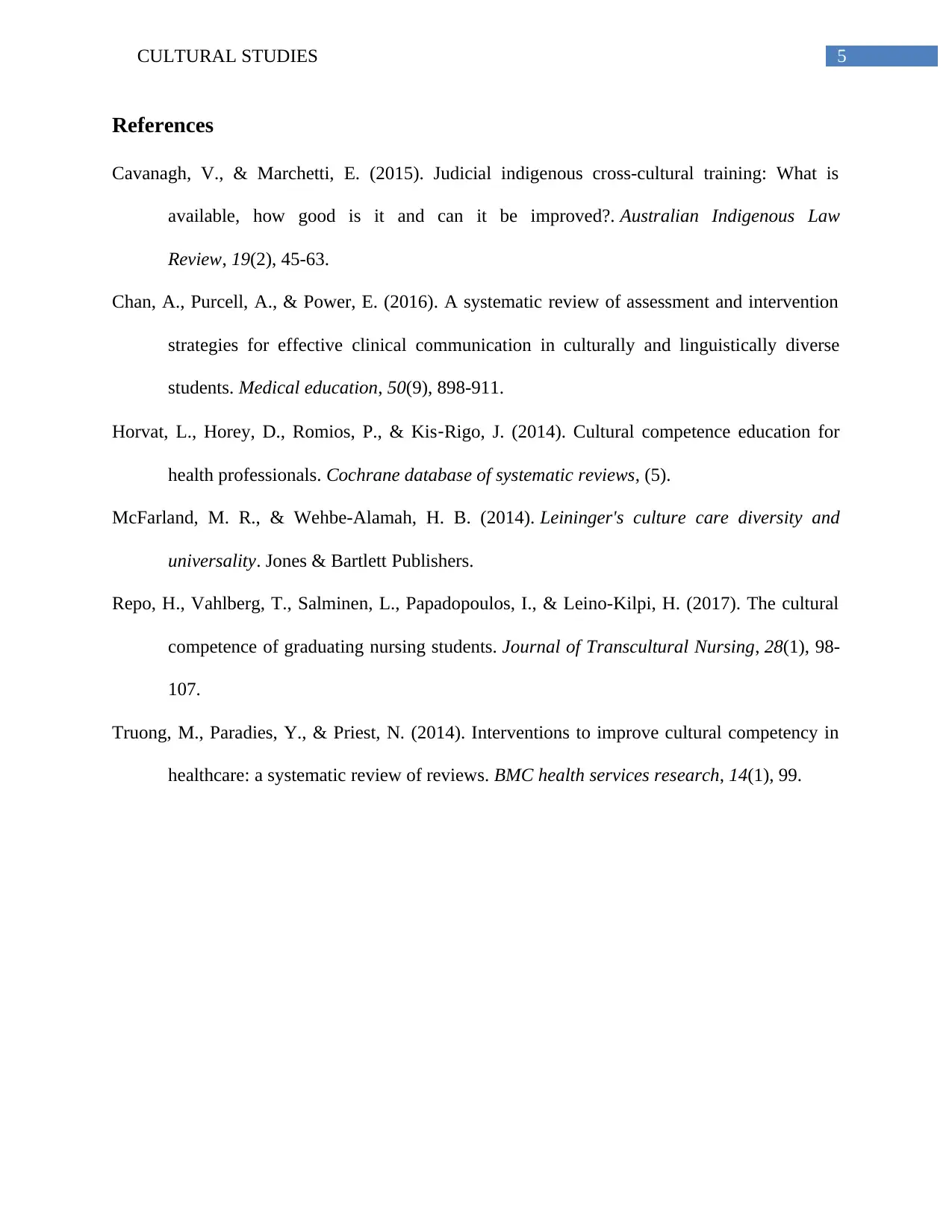
5CULTURAL STUDIES
References
Cavanagh, V., & Marchetti, E. (2015). Judicial indigenous cross-cultural training: What is
available, how good is it and can it be improved?. Australian Indigenous Law
Review, 19(2), 45-63.
Chan, A., Purcell, A., & Power, E. (2016). A systematic review of assessment and intervention
strategies for effective clinical communication in culturally and linguistically diverse
students. Medical education, 50(9), 898-911.
Horvat, L., Horey, D., Romios, P., & Kis‐Rigo, J. (2014). Cultural competence education for
health professionals. Cochrane database of systematic reviews, (5).
McFarland, M. R., & Wehbe-Alamah, H. B. (2014). Leininger's culture care diversity and
universality. Jones & Bartlett Publishers.
Repo, H., Vahlberg, T., Salminen, L., Papadopoulos, I., & Leino-Kilpi, H. (2017). The cultural
competence of graduating nursing students. Journal of Transcultural Nursing, 28(1), 98-
107.
Truong, M., Paradies, Y., & Priest, N. (2014). Interventions to improve cultural competency in
healthcare: a systematic review of reviews. BMC health services research, 14(1), 99.
References
Cavanagh, V., & Marchetti, E. (2015). Judicial indigenous cross-cultural training: What is
available, how good is it and can it be improved?. Australian Indigenous Law
Review, 19(2), 45-63.
Chan, A., Purcell, A., & Power, E. (2016). A systematic review of assessment and intervention
strategies for effective clinical communication in culturally and linguistically diverse
students. Medical education, 50(9), 898-911.
Horvat, L., Horey, D., Romios, P., & Kis‐Rigo, J. (2014). Cultural competence education for
health professionals. Cochrane database of systematic reviews, (5).
McFarland, M. R., & Wehbe-Alamah, H. B. (2014). Leininger's culture care diversity and
universality. Jones & Bartlett Publishers.
Repo, H., Vahlberg, T., Salminen, L., Papadopoulos, I., & Leino-Kilpi, H. (2017). The cultural
competence of graduating nursing students. Journal of Transcultural Nursing, 28(1), 98-
107.
Truong, M., Paradies, Y., & Priest, N. (2014). Interventions to improve cultural competency in
healthcare: a systematic review of reviews. BMC health services research, 14(1), 99.
⊘ This is a preview!⊘
Do you want full access?
Subscribe today to unlock all pages.

Trusted by 1+ million students worldwide
1 out of 6
Your All-in-One AI-Powered Toolkit for Academic Success.
+13062052269
info@desklib.com
Available 24*7 on WhatsApp / Email
![[object Object]](/_next/static/media/star-bottom.7253800d.svg)
Unlock your academic potential
Copyright © 2020–2025 A2Z Services. All Rights Reserved. Developed and managed by ZUCOL.


